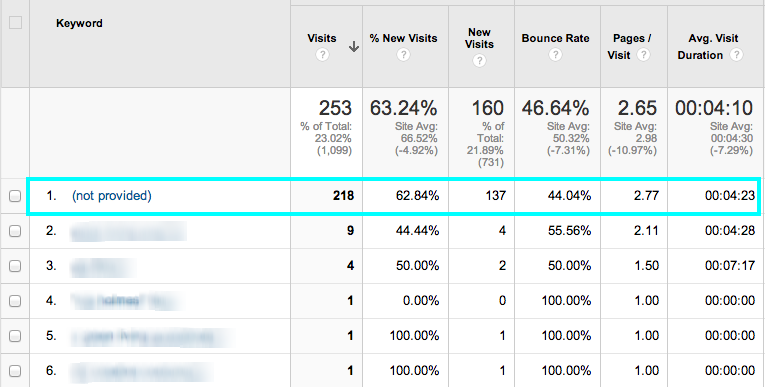A big thing happened in October 2011 that dramatically changed Google Search Analytics. In order to protect the privacy of it’s users, Google began conducting search over SSL (https://www.google.com). An important result of this is that all referral data relating to search is now hidden, including the all important keywords data that we covet so dearly. In layman’s terms, Google has decided to stop showing you the keywords that are driving traffic to your site. Google still has the data mind you, but webmasters and site owners can no longer access it through their Google Analytics accounts.
A typical report for Organic Search Traffic now often shows 90% or more as Not Provided Keywords. Here’s an example of what it could look like:
With holes likes this in the data, site owners are at a loss when trying to decipher what keywords and phrases are driving traffic to their sites. Google says that this has been done in the name of privacy, but some speculate there are other reasons (this data is still available to anyone using AdWords and PPC advertising for example).
Not all is lost! There are some useful workarounds and they are summarized below:
- Make sure you are getting the most you can out of the other search engines. If you are getting a decent amount of traffic from Bing, make sure to use their keyword data – they have not turned it off.
- Make sure you have a site search bar on your web site and that you monitor your visitor’s searches in Google Analytics (there are many good articles on how to do this including this from Google – click here).
- Google Webmaster Tools still provides a lot of keyword data. It’s not everything, but there is a lot there. Click on Search Traffic/Search Queries in GWT.
- Create a Google Adwords account and use their Keyword Planner tool for recommendations and ideas. This will help you focus your content on the most effective keywords that will ultimately drive thee most traffic to your site..
- There are many great “pay for” online tools and services that can help you identify keywords and phrases that you should be using. Check out RavenTools or SEMrush.
- Pay attention to Google’s recommended related searches that appear at the bottom of SERPs. This is a great way to discover new keywords and phrases that you should be focusing on.
- Use Google Analytics to examine your search traffic and landing pages. You know your keywords best, and if certain pages are performing well, you can safely assume those keywords are working!
Google’s policy on “not provided” data is both frustrating and controversial. Keep in mind that the basics are the same. Good content + effective SEO techniques = Success. Keep up the fight!




